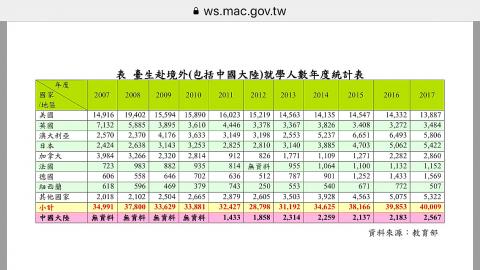The number of Taiwanese senior-high school graduates pursuing further studies abroad increased by more than 20 percent from about 32,000 people in 2011 to more than 40,000 people in 2017, the latest data from the Ministry of Education showed.
Due to the nation’s declining birthrate, the number of senior-high school graduates dropped from about 400,000 people in 2011 to 350,000 people in 2017 and further down to about 330,000 people last year, the data showed.
The number of senior-high school graduates pursuing higher education in China increased from 1,433 people in 2011 to 2,567 people in 2017, rising by about 80 percent, but accounting for less than 6 percent of the total number of those studying abroad, which shows that China does not attract Taiwanese students as much as English-speaking countries do.

Photo copied by Lin Hsiao-yun, Taipei Times
However, the increasing number of high-school graduates studying abroad poses a threat to the nation’s higher education system.
While Taiwanese universities still have a competitive advantage, the ministry this year is to grant an additional NT$1.3 billion (US$42.09 million) to 10 universities, including National Taiwan University, National Cheng Kung University, National Tsing Hua University and National Chiao Tung University, to enhance their international competitiveness, Department of Higher Education Director-General Chu Chun-chang (朱俊彰) said.
Ministry data showed that among the more than 30,000 senior-high school graduates studying abroad every year, the US was the most favored destination, followed by Japan, Australia and the UK.
In 2017, among the 40,009 senior-high school graduates who went on to study overseas, 13,887 people chose the US; 5,806 people picked Australia; 5,422 people went to Japan; and 2,567 people selected China, similar to the number that went to Canada, 2,860 people, the data showed.
The data also showed that among the list of senior-high schools whose students went on to study abroad after graduating in 2017, six of the top 10 schools were private schools.
Despite the media hype that Taiwanese students are increasingly choosing China for further studies, the data showed that a majority are still opting for the US or European nations, Chu said.
Boosting the competitive advantages of Taiwanese universities is the best way to keep senior-high school graduates in Taiwan, Chu said, adding that according to the Global Competitiveness Report 2017–2018 published by the World Economic Forum, Taiwan’s higher education and training ranked 17th in the world, while China only ranked 47th.
Aside from the additional subsidy to bolster universities’ competitiveness, the ministry is also cooperating with universities to offer international student exchanges, short-term programs, conferences and internship opportunities to attract foreign students and researchers to facilitate exchanges with students and teachers in Taiwan.
Taiwanese universities still offer students a chance to cultivate a global perspective and a promising future, Chu said.
Students opting to go to China should be aware of the risks that the Mainland Affairs Council has mentioned, because while Taiwan’s education environment allows freedom of speech and unlimited research topics, students in China have limited freedom of speech and expression in class or on the Internet, he said.

A preclearance service to facilitate entry for people traveling to select airports in Japan would be available from Thursday next week to Feb. 25 at Taiwan Taoyuan International Airport, Taoyuan International Airport Corp (TIAC) said on Tuesday. The service was first made available to Taiwanese travelers throughout the winter vacation of 2024 and during the Lunar New Year holiday. In addition to flights to the Japanese cities of Hakodate, Asahikawa, Akita, Sendai, Niigata, Okayama, Takamatsu, Kumamoto and Kagoshima, the service would be available to travelers to Kobe and Oita. The service can be accessed by passengers of 15 flight routes operated by

MORE FALL: An investigation into one of Xi’s key cronies, part of a broader ‘anti-corruption’ drive, indicates that he might have a deep distrust in the military, an expert said China’s latest military purge underscores systemic risks in its shift from collective leadership to sole rule under Chinese President Xi Jinping (習近平), and could disrupt its chain of command and military capabilities, a national security official said yesterday. If decisionmaking within the Chinese Communist Party has become “irrational” under one-man rule, the Taiwan Strait and the regional situation must be approached with extreme caution, given unforeseen risks, they added. The anonymous official made the remarks as China’s Central Military Commission Vice Chairman Zhang Youxia (張又俠) and Joint Staff Department Chief of Staff Liu Zhenli (劉振立) were reportedly being investigated for suspected “serious

ENHANCING EFFICIENCY: The apron can accommodate 16 airplanes overnight at Taoyuan airport while work on the third runway continues, the transport minister said A new temporary overnight parking apron at Taiwan Taoyuan International Airport is to start operating on Friday next week to boost operational efficiency while the third runway is being constructed, the Ministry of Transportation and Communications said yesterday. The apron — one of the crucial projects in the construction of the third runway — can accommodate 16 aircraft overnight at the nation’s largest international airport, Minister of Transportation and Communications Chen Shih-kai (陳世凱) told reporters while inspecting the new facility yesterday morning. Aside from providing the airport operator with greater flexibility in aircraft parking during the third runway construction,

American climber Alex Honnold is to attempt a free climb of Taipei 101 today at 9am, with traffic closures around the skyscraper. To accommodate the climb attempt and filming, the Taipei Department of Transportation said traffic controls would be enforced around the Taipei 101 area. If weather conditions delay the climb, the restrictions would be pushed back to tomorrow. Traffic controls would be in place today from 7am to 11am around the Taipei 101 area, the department said. Songzhi Road would be fully closed in both directions between Songlian Road and Xinyi Road Sec 5, it said, adding that bidirectional traffic controls would